Check It Out:
Jacob Lawrence "One-Way Ticket: Jacob Lawrence's Migration Series and Other Visions of the Great Movement North"
May 25, 2015 | Revolution Newspaper | revcom.us
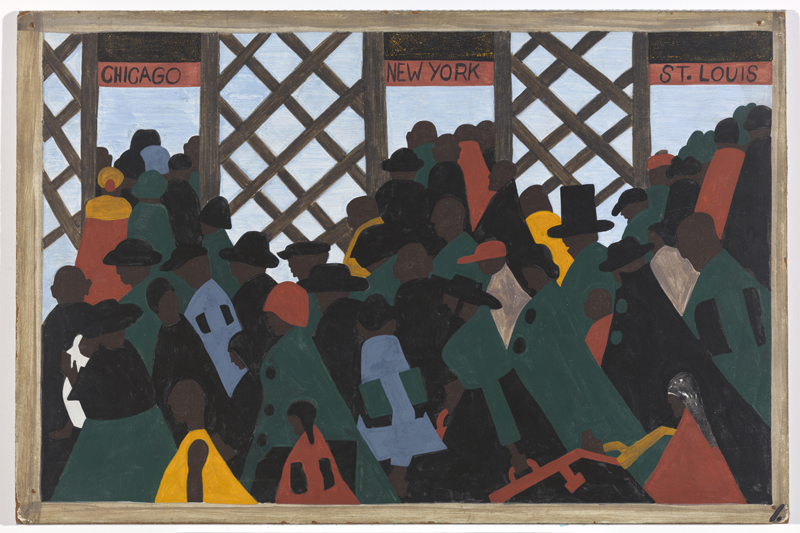 Panel 1: "During the World War there was a great migration North by Southern Negroes." (original caption by Jacob Lawrence)
Panel 1: "During the World War there was a great migration North by Southern Negroes." (original caption by Jacob Lawrence)
Casein tempera on hardboard, 18 x 12″ (45.7 x 30.5 cm). The Phillips Collection, Washington D.C. Acquired 1942. © 2015 The Jacob and Gwendolyn Knight Lawrence Foundation, Seattle / Artists Rights Society (ARS), New York. Photograph courtesy The Phillips Collection, Washington D.C.
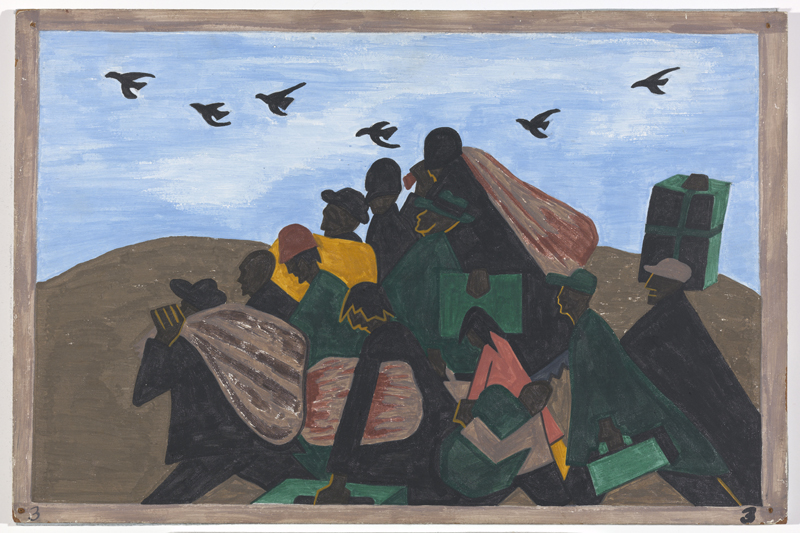 Panel 3: "In every town Negroes were leaving by the hundreds to go North and enter into Northern industry." (original caption by Jacob Lawrence)
Panel 3: "In every town Negroes were leaving by the hundreds to go North and enter into Northern industry." (original caption by Jacob Lawrence)
Casein tempera on hardboard, 18 x 12″ (45.7 x 30.5 cm). The Phillips Collection, Washington D.C. Acquired 1942. © 2015 The Jacob and Gwendolyn Knight Lawrence Foundation, Seattle / Artists Rights Society (ARS), New York. Photograph courtesy The Phillips Collection, Washington D.C.
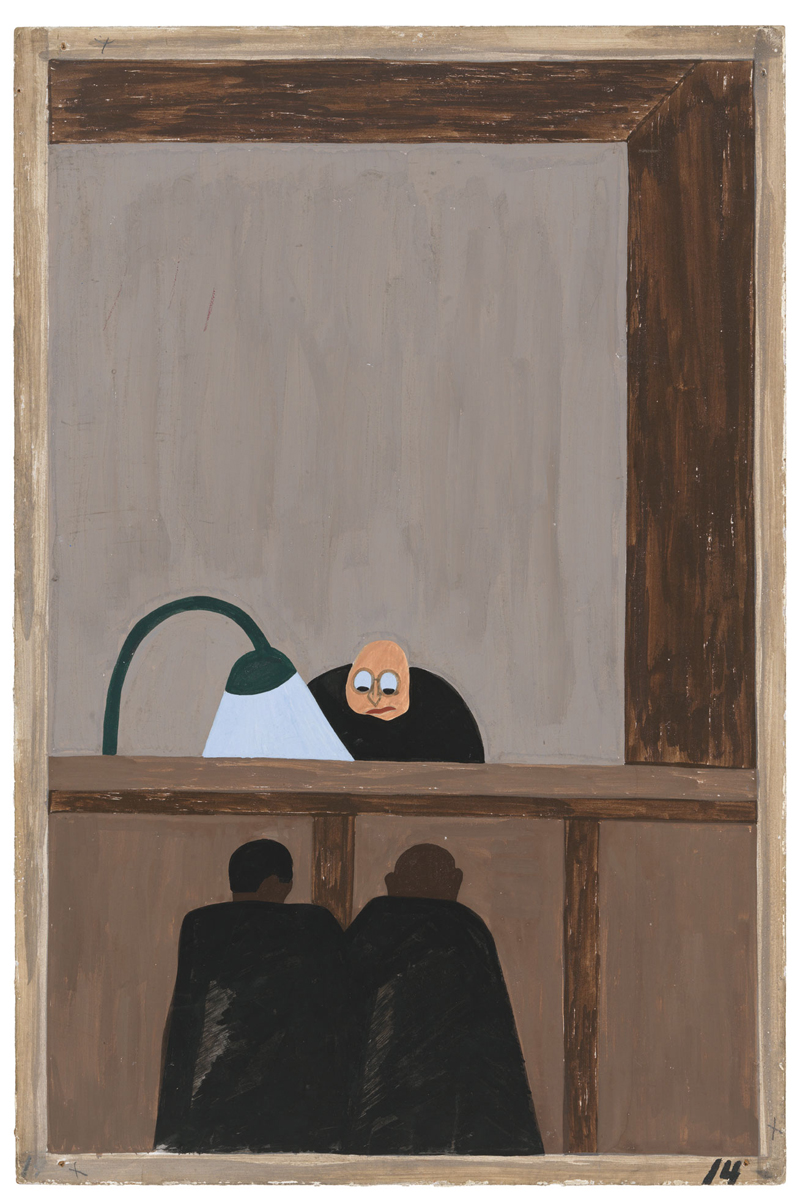
Panel 14: "Among the social conditions that existed which was partly the cause of the migration was the injustice done to the Negroes in the courts." (original caption by Jacob Lawrence)
Casein tempera on hardboard, 18 x 12″ (45.7 x 30.5 cm). The Museum of Modern Art, New York. Gift of Mrs. David M. Levy. © 2015 The Jacob and Gwendolyn Knight Lawrence Foundation, Seattle / Artists Rights Society (ARS), New York. Digital image © The Museum of Modern Art/Licensed by SCALA / Art Resource, NY
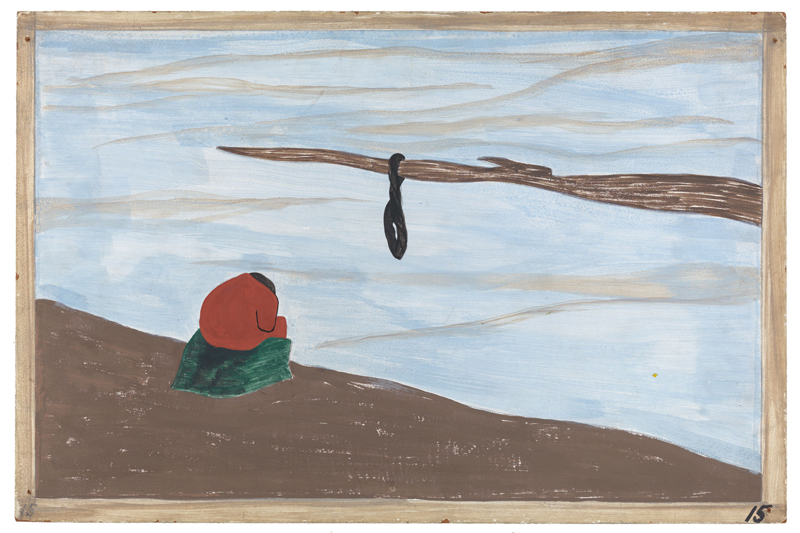 Panel 15: "Another cause was lynching. It was found that where there had been a lynching, the people who were reluctant to leave at first left immediately after this."
Panel 15: "Another cause was lynching. It was found that where there had been a lynching, the people who were reluctant to leave at first left immediately after this."
Casein tempera on hardboard, 18 x 12″ (45.7 x 30.5 cm). The Phillips Collection, Washington D.C. Acquired 1942. © 2015 The Jacob and Gwendolyn Knight Lawrence Foundation, Seattle / Artists Rights Society (ARS), New York. Photograph courtesy The Phillips Collection, Washington D.C.
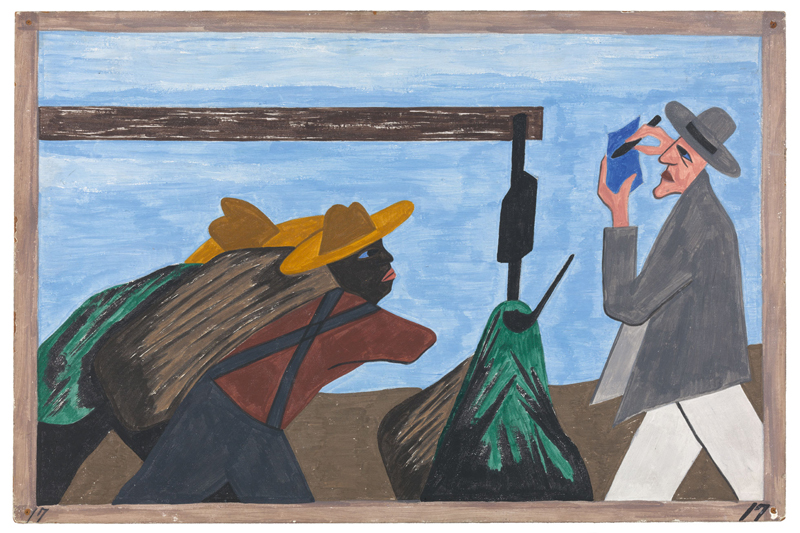 Panel 17: "The migration was spurred on by the treatment of the tenant farmers by the planter."
Panel 17: "The migration was spurred on by the treatment of the tenant farmers by the planter."
Casein tempera on hardboard, 18 x 12″ (45.7 x 30.5 cm). The Phillips Collection, Washington D.C. Acquired 1942. © 2015 The Jacob and Gwendolyn Knight Lawrence Foundation, Seattle / Artists Rights Society (ARS), New York. Photograph courtesy The Phillips Collection, Washington D.C.
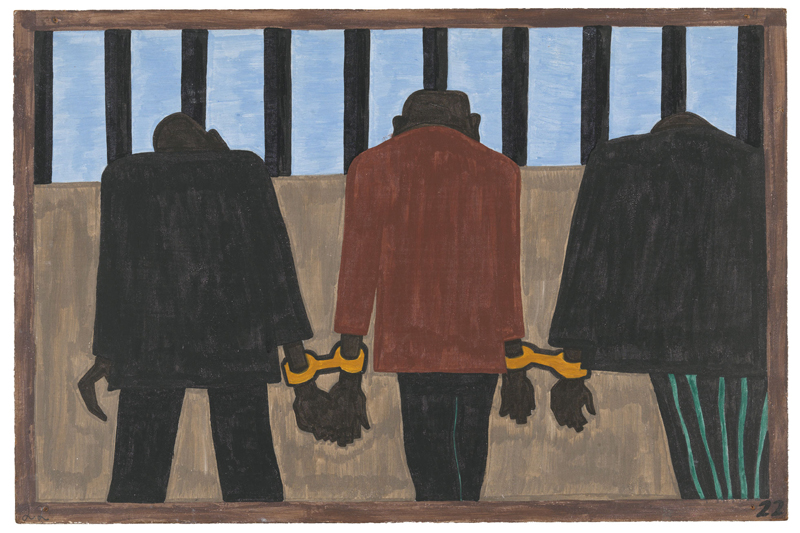 Panel 22: "Another of the social causes of the migrants' leaving was that at times they did not feel safe, or it was not the best thing to be found on the streets late at night. They were arrested on the slightest provocation."
Panel 22: "Another of the social causes of the migrants' leaving was that at times they did not feel safe, or it was not the best thing to be found on the streets late at night. They were arrested on the slightest provocation."
Casein tempera on hardboard, 18 x 12″ (45.7 x 30.5 cm). The Museum of Modern Art, New York. Gift of Mrs. David M. Levy. © 2015 The Jacob and Gwendolyn Knight Lawrence Foundation, Seattle / Artists Rights Society (ARS), New York. Digital image © The Museum of Modern Art/Licensed by SCALA / Art Resource, NY
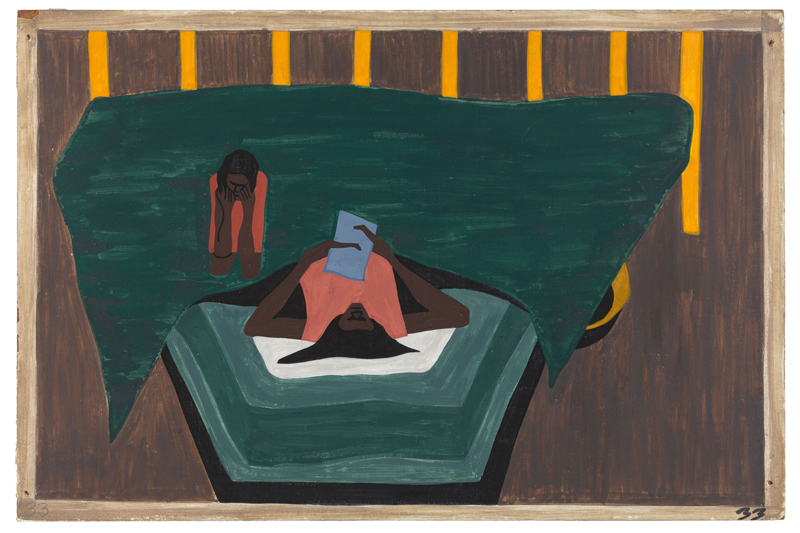 Panel 33: "People who had not yet come North received letters from their relatives telling them of the better conditions that existed in the North."
Panel 33: "People who had not yet come North received letters from their relatives telling them of the better conditions that existed in the North."
Casein tempera on hardboard, 18 x 12″ (45.7 x 30.5 cm). The Phillips Collection, Washington D.C. Acquired 1942. © 2015 The Jacob and Gwendolyn Knight Lawrence Foundation, Seattle / Artists Rights Society (ARS), New York. Photograph courtesy The Phillips Collection, Washington D.C.
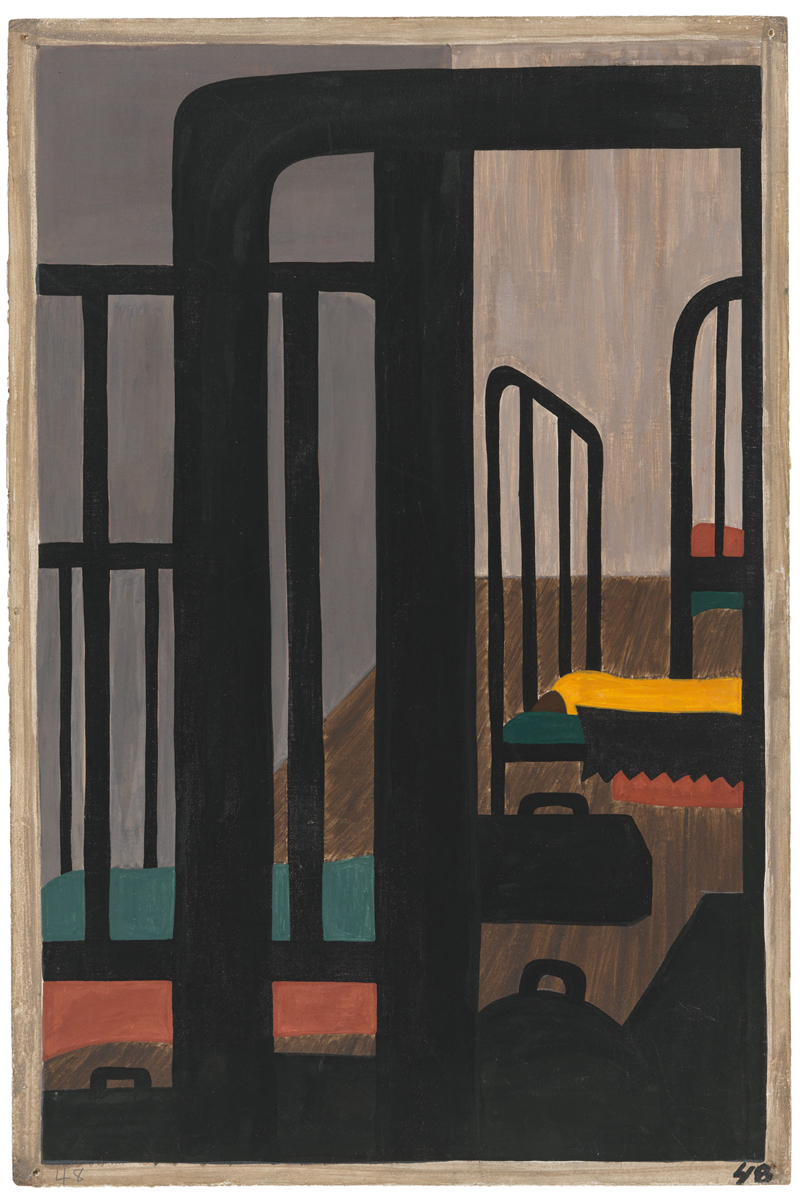
Panel 48: "Housing for the Negroes was a very difficult problem."
Casein tempera on hardboard, 18 x 12″ (45.7 x 30.5 cm). The Museum of Modern Art, New York. Gift of Mrs. David M. Levy. © 2015 The Jacob and Gwendolyn Knight Lawrence Foundation, Seattle / Artists Rights Society (ARS), New York. Digital image © The Museum of Modern Art/Licensed by SCALA / Art Resource, NY
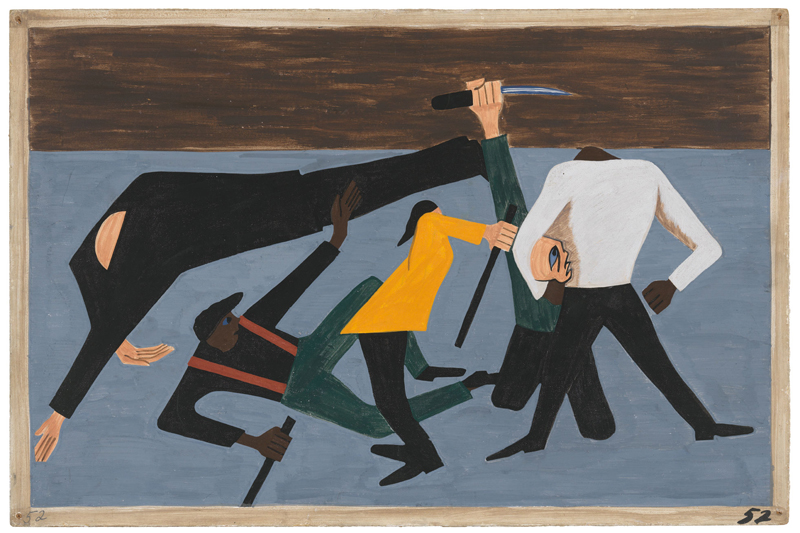 Panel 52: "One of the largest race riots occurred in East St. Louis."
Panel 52: "One of the largest race riots occurred in East St. Louis."
1941. Casein tempera on hardboard, 18 x 12″ (45.7 x 30.5 cm). The Museum of Modern Art, New York. Gift of Mrs. David M. Levy. © 2015 The Jacob and Gwendolyn Knight Lawrence Foundation, Seattle / Artists Rights Society (ARS), New York. Digital image © The Museum of Modern Art/Licensed by SCALA / Art Resource, NY
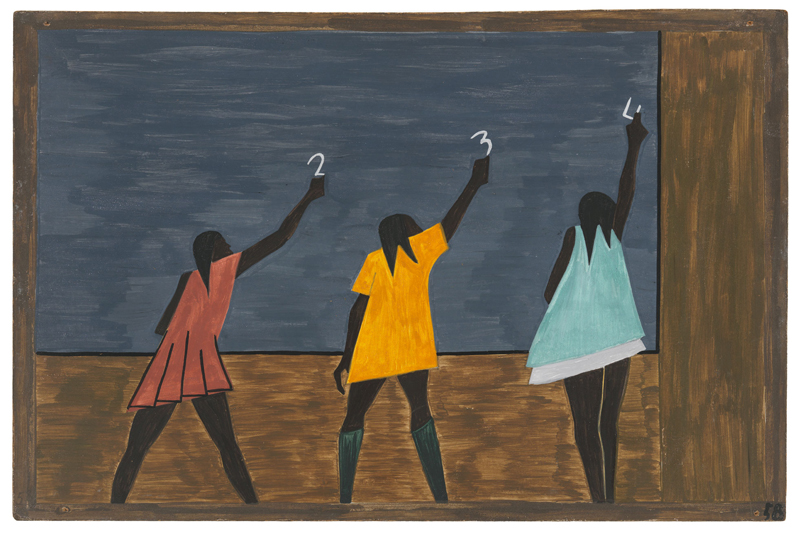 Panel 58: "In the North the Negro had better educational facilities."
Panel 58: "In the North the Negro had better educational facilities."
Casein tempera on hardboard, 18 x 12″ (45.7 x 30.5 cm). The Museum of Modern Art, New York. Gift of Mrs. David M. Levy. © 2015 The Jacob and Gwendolyn Knight Lawrence Foundation, Seattle / Artists Rights Society (ARS), New York. Digital image © The Museum of Modern Art/Licensed by SCALA / Art Resource, NY
All images used with permission of MoMA
From a reader
I want to encourage readers who can make it to New York City this spring, summer or early fall to make it to the exhibit "One-Way Ticket: Jacob Lawrence's Migration Series and Other Visions of the Great Movement North."
This is a rare exhibit of the entire series of sixty numbered panels, painted and captioned by Jacob Lawrence, documenting the great migration of what would end up being some six million Black people from the Jim Crow, sharecropping south, to what was supposed to be the "promised land" in the North – to New York, Chicago, Cleveland, Detroit, Philadelphia, Pittsburgh, and Saint Louis and beyond. Completed in 1941, Jacob Lawrence's set of paintings bring that mass migration to life.
I'm not, unfortunately, a student of art history but its easy to feel influences of many cultures and radical artistic trends in art, literature, posters, dance, jazz and the blues in Jacob Lawrence's iconic technique -- vivid colors, striking shapes, energy, motion -- Bold as Love, as Jimi Hendrix would sing a generation later. Lawrence's medium of acrylic-like casein tempera paint on hardboard (wood panels) is almost shockingly basic. But you can stare at any one of these panels for hours, appreciating new angles, depth, and insights.
This exhibit of Lawrence's series of panels connects us viscerally and phenomenally with the human beings who made up the vast sea of ex-slaves and tenant farmers --uprooted from their shacks and eking out an existence from the land – as they made the dangerous trek into the unknown north, pulled by the promise of equality and a chance for a life in a larger world.
Lawrence takes us into the living rooms in crowded segregated ghettos, the hell-hole slaughterhouses and factories, and the courtrooms of injustice that Black people found in the cities of the north. We can view these images with even more bitter irony today, when the brutally exploitive jobs Black people were brought to do have largely been shipped by the workings of capitalism-imperialism to lands where workers can be even more viciously exploited, leaving millions of Black people trapped, locked down, and literally under the gun in the same cities – vilified, demonized, and dehumanized by the same system that built so much of its wealth on the sweat and blood of Black people.
Along with the complete series of Lawrence's paintings, the exhibit includes substantial and insightful documentation and insights into the great migration, the factors behind it, the travails Black people faced in the South and in the North. There are original printings of books by authors like Richard Wright and Langston Hughes. Along with the paintings, a not-to-miss event in the exhibit is a high quality video of Billie Holiday singing "Strange Fruit" -- a simmering and stunning rendition of that damning indictment of lynching. That video is available on YouTube.
If you can't make it in-person, visit MoMA's multimedia website focused on Jacob Lawrence's Migration Series at MoMA.org/MigrationSeries. The website explores Lawrence's biography and career; artists and intellectuals who inhabited Lawrence's world and contemporaneous historical, literary, musical, and artistic interpretations of the Migration; historical and visual sources for Lawrence's work, especially the popular and print culture of the 1930s and 1940s; and the social history of the Migration.
Volunteers Needed... for revcom.us and Revolution
If you like this article, subscribe, donate to and sustain Revolution newspaper.






